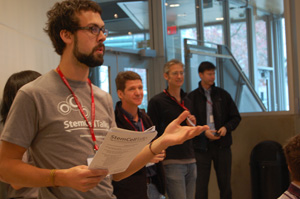
Ben Paylor introducing speakers at StemCellTalks
by Ben Paylor, Maisam Makarem and Véronique Lecault
December 3rd, 2010. 8:45am. The auditorium lights of the Michael Smith Laboratories at UBC dimmed on nearly 50 eager Greater Vancouver high school students and 15 volunteers. The mood was one of excitement and nervousness, although some had an idea about what the day would hold, nobody really knew for sure. Following the ever-relevant Stem Cell Charter video, the lights came on and the first satellite StemCellTalks symposium in Vancouver began.
First on the podium was a local bone-marrow transplant expert, Dr. Kai Luecke, interviewing a patient who had benefited from stem cell transplantation after being diagnosed with acute myeloid leukemia. Together, they guided us through a moving story from initial diagnosis, to therapy and eventual recovery. It was the perfect start to the day as it gave the students a firsthand clinical perspective on how stem cells are currently used today.
 |
| Dr. Tim Kieffer talks diabetes to Vancouver high school students. |
Following the opening session, the students were challenged by Dr. Fabio Rossi to tackle important questions about the characteristics and origins of stem cells. His lecture was peppered with laughter and the questions that followed were the first of many indications that these students were not just interested in being listeners at the symposium, but instead were key participants in every aspect of the day.
The students then divided into groups of eight to tackle stem cell-related cases. For the first case, Dr. Tim Kieffer gave the students a thorough background on diabetes and the therapeutic potential of either gene therapy or cell therapy to treat Type 1 Diabetes. Relating it to a specific patient, the students were then asked to choose which form of therapy they would advocate to treat the patient. The majority of the groups supported the use of gene therapy to artificially introduce glucose-regulated insulin genes into gut-derived K-cells which could potentially be transplanted into patients as a future treatment option.
For the second case study, Drs. Fabio Rossi and Kelly McNagny presented a case which again pitted gene therapy against stem cell therapy, but this time framed around a juvenile patient who was diagnosed with X-linked severe combined immunodeficiency (X-SCID). The friendly yet intense debate between the two professors, who have worked collaboratively for many years, was akin to the rivalry between Obi Wan Kenobi and Darth Vader, although no light sabers were required for this duel. The final decisions from the students were equally distributed, which was a testament to the fact that many of these decisions were difficult to make.
With an array of graduate students and industry representatives on hand during the lunch break, students were encouraged to ask questions and find out what it meant to be a scientist and how one would go about becoming one. We had numerous sponsors who helped make this event possible through their support and we extend a heartfelt thanks to the Stem Cell Network, Let’s Talk Science, StemCell Technologies, Genome BC, as well as the BC Year of Science.
 |
| The students at StemCellTalks debate gene therapy versus stem cell therapy for a fictitious patient with severe immunodeficiency. |
After lunch, the focus of the event switched to stem cell ethics. Timothy Caulfield reprised his role in the inaugural StemCellTalks event earlier this year by priming the students for the afternoon’s ethics case. His introduction to thinking ethically tackled numerous important issues surrounding stem cell research, and addressed the ethical, legal and political realities of stem cells, and particular the issue of informed consent. Following this, another renowned Canadian bioethics expert, Dr. Michael McDonald, gave a lecture on informed consent. Dr. McDonald presented the fascinating and current story of Henrietta Lacks, whose cells are used in labs all around the world years after her death — without the support of her family. The story provided a constructive framework around which to tackle the question of how research should be conducted.
At the close of the symposium, students were encouraged to share what they had learned with their friends, families and classmates. This dissemination is crucial to the design of StemCellTalks to allow the knowledge to have impact beyond the symposium itself.
This first satellite StemCellTalks event, organized by Maisam Makarem, Véronique Lecault, Ben Paylor and Michael Copley, received unanimously positive feedback from participants, volunteers and speakers. It demonstrates that this model of stem cell education is an incredibly engaging and dynamic way to gather local experts, eager stem cell researchers, and curious high school students together.
Stem Cell Network
Latest posts by Stem Cell Network (see all)
- Welcome to our new niche! - May 16, 2012
- 2012 Cells I See winners - May 11, 2012
- A crack in the origin of eggs: policy and fertility implications of oogonial stem cells - March 5, 2012






That would have been an interesting one to listen in on. I for one am completely for stem cell research, I don’t think anyone has a right to hold back medical advances because of outdated and uninformed misconceptions.